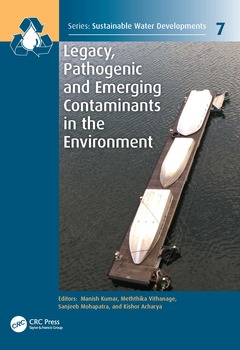Description
Legacy, Pathogenic and Emerging Contaminants in the Environment
Sustainable Water Developments - Resources, Management, Treatment, Efficiency and Reuse Series
Coordinators: Kumar Manish, Vithanage Meththika, Mohapatra Sanjeeb, Acharya Kishor
Language: English
Subjects for Legacy, Pathogenic and Emerging Contaminants in the...:
Keywords
Acute Gastroenteritis; Tamil Nadu; Sea Water; Saltwater; Perfluorooctane Sulfonate; PFOA; Soil Contamination; AMR; Antibiotic Resistant Bacteria; SARS CoV; Groundwater Governance; CW System; NCBI Blast Database; Negative Sense RNA Virus; CW; Scenedesmus Obliquus; ECs; Freshwater Microalga; Dairy Wastewater; Vertical Subsurface Flow; Anaerobic AOB; Vertical Subsurface Flow CW; Surface Waterbodies; Faecal Pollution; Arb
· 17.4x24.6 cm · Hardback
Description
/li>Contents
/li>Readership
/li>Biography
/li>
This is the time when legacy, pathogenic, and emerging contaminants must be talked about, understood, and dealt with together. While the geogenic contamination of the groundwater is a well-established phenomenon that is considered as legacy contaminants that risk people?s health globally, both pathogenic and emerging contaminants like various water-borne pathogens and pharmaceutical personal care products (PPCPs) are becoming imperative for their acute and chronic toxic effects. While contaminated groundwater consumption leads to skin pigmentation, hyperkeratosis, kidney damage, cardiovascular disease, and children?s overall development, poor sanitation-related pathogenic microorganisms cause a significant number of child and prenatal deaths. Simultaneously, antibiotic microbial resistance (AMR) is expected to kill 100 million people by 2050. However, there are rare texts that combine aspects of all these three under a single book cover.
This book gives an understanding of the occurrence, fate, and transport of geogenic, microbial, and anthropogenic contaminants in the groundwater. It covers not only the scientific and technical aspects but also environmental, legal, and policy aspects for contaminant management in the environment under the paradigm shift of COVID-19. This book is intended to bring the focus on the natural contaminants?biotic or abiotic?in the post-COVID Anthropocene, which is illustrating a significant alteration of systems and the subsequent downstream impacts owing to globalization. This book has compiled global work on emergence, mass flow, partitioning, and activation of geogenic, emerging, and pathogenic contaminants in various spheres of environment with special emphasis on soil, sediment, and aquatic systems for enhancing the understanding on their migration and evolution for the welfare of mankind.
Section 1 Distribution, occurrence, and fate of emerging contaminants 1. Occurrence and fate of emerging contaminants in groundwater 2. Occurrence, sources, and the fate of antibiotics, antibiotic-resistant bacteria and their resistance genes in groundwater and subsurface environment 3. Fate and transport of micro- and nanoplastics in graywater, fresh and marine water systems 4. Solid waste and landfill leachate: The transient sources of emerging microbes and legacy contaminants for groundwater pollution 5. Emerging groundwater contaminants: Their manifestation and consequences Section 2 Techniques to study the fate, transport and removal of microbial contaminants 6. Assessment of microbial load removal potential of vertical constructed wetland systems treating dairy farm wastewater 7. Occurrence and fate of viruses in water 8. Microbial indicators and methods for source tracking faecal contamination of groundwater 9. Pathways for migration of microbial and organic contaminants: Special emphasis on run-off from aquaculture industries 10. Analysis of emerging microbial contaminants through next-generation sequencing Section 3 Environmental and health risk of anthropogenic and geogenic contaminants 11. Emerging contaminants of potential concern in aquatic Ecosystem: Fate and transport in microalgae 12. Contaminants of emerging concerns and advanced treatment technologies 13. Occurrence and fate of phenolic compounds in groundwater and their associated risks 14. Sustainable governance of groundwater as drinking water in the post-COVID-19 world: An urban water security perspective 15. Comprehensive understanding of fate, transport and consequences of contaminants of emerging concerns (CECs) in urban environment
Dr. Manish Kumar is an assistant professor at Indian Institute of Technology Gandhinagar, India.
Prof. Meththika Vithanage is working at the Ecosphere Resilience Research Centre, University of Sri Jayewardenepura, Sri Lanka.
Dr. Sanjeeb Mohapatra works at the Environmental Research Institute, National University of Singapore (NUS), Singapore.
Dr. Kishor Acharya is a postdoctoral researcher at the School of Engineering, Newcastle University, UK, specialized in public health engineering.




